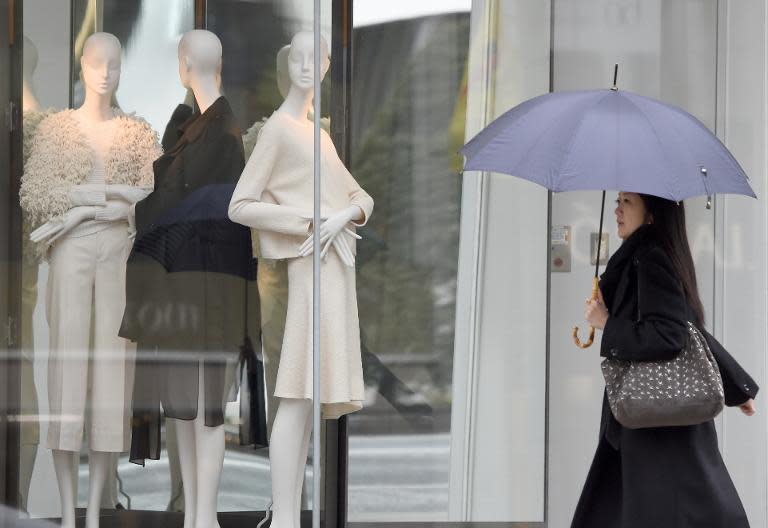Bank of Japan sees zero inflation in setback for 'Abenomics'
Japan's central bank said Tuesday that tumbling world energy prices could push inflation to zero, marking a big setback in Tokyo's attempt to kickstart the world's number three economy. While the Bank of Japan said inflation expectations were "rising on the whole" -- and it held fire on launching fresh stimulus -- the comments underscore faltering efforts to conquer years of deflation that have been blamed for holding back growth. Inflation "is likely to be around zero for the time being... but, of course, depending on the trend in energy prices it may briefly fall below zero," BoJ chief Haruhiko Kuroda told reporters after ending a two-day policy meeting Tuesday. "We think that the basic trend in prices... is steadily improving," he added. Tokyo's economy-boosting campaign stumbled after the government raised sales taxes in 2014 to help pay down Japan's enormous national debt. That hammered consumer spending and led to a brief recession, while falling oil prices have complicated efforts to banish deflation. The BoJ now expects the core consumer price index to hover in a zero to 0.5 percent range -- a long way from its 2.0 percent target. That target is a cornerstone of Prime Minister Shinzo Abe's drive to resuscitate Japan's fortunes, dubbed Abenomics, which also includes big government spending and an overhaul of the highly regulated economy. Kuroda was tapped by Abe in March 2013 to head up the BoJ, with the former Asian Development Bank boss insisting that sustained inflation could be achieved in about two years. On Tuesday Kuroda shrugged off questions about whether he would quit over the now-missed target. "What's important is the overall trend (in prices)...and the trend is not down," he added. Annual labour talks between workers and some of Japan's biggest firms were likely to usher in pay rises and more spending, Kuroda said. "Given record-high corporate profits and the tight labour market, I think the conditions are there for wage rises," he said. - Deflation war not over - Speaking to parliament, Japan's premier conceded that dragging the country out of years of stagnant or falling prices was still a way off. "Unfortunately, we are not in a situation where we have come out of deflation, but we have been able to create a situation where we are making our way out of deflation," Abe said. However a growing number of economists have cast doubt on the chances of the BoJ reaching its target without further expanding an already huge monetary easing scheme, launched two years ago. And minutes from the central bank's January meeting showed that three of nine board members themselves doubted the BoJ would reach the target by next year. "We still think that policymakers will step up the pace of easing at the end of next month to signal their determination to hit the two percent inflation target," Marcel Thieliant from Capital Economics said in a commentary. But Koya Miyamae, an economist at SMBC Nikko Securities, took a different view. "The BoJ is admitting that consumer prices could fall, while indicating that it’s not planning steps to counter that," Miyamae told Bloomberg News. "The shift cements a view that the BoJ won’t add stimulus for a while." Policymakers shocked markets last October when they expanded their easing programme -- which pumps cash into the banking system in a bid to kickstart the wider economy -- to a rate of about 80 trillion yen ($679 billion) annually. Tokyo's policy blitz appeared to be bearing fruit at first, as it drove down the yen and set off a stock market rally. Prices had also been on the rise, largely due to Japan having to import pricey fossil fuels to plug an energy gap left by the shutdown of atomic reactors after the 2011 Fukushima accident. But plunging oil prices have dealt a serious blow -- Japan's core inflation rate in January was just 0.2 percent. This was the lowest since a zero level in May 2013, just after the BoJ unleashed its monetary easing programme.

 Yahoo Finance
Yahoo Finance 



